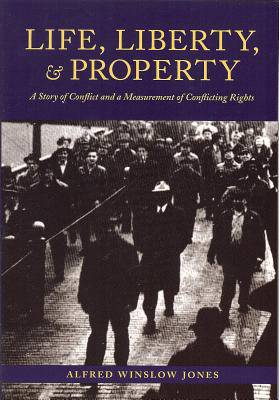
- Afhalen na 1 uur in een winkel met voorraad
- Gratis thuislevering in België vanaf € 30
- Ruim aanbod met 7 miljoen producten
- Afhalen na 1 uur in een winkel met voorraad
- Gratis thuislevering in België vanaf € 30
- Ruim aanbod met 7 miljoen producten
Zoeken
Life, Liberty, and Property
A Story of Conflict and a Measurement of Conflicting Rights
€ 26,45
+ 52 punten
Omschrijving
In the fall of 1938, Alfred Winslow Jones, a Columbia University graduate student, interviewed 1,705 Akron, Ohio, residents in order to gauge attitudes toward large corporations. Jones selected Akron because it was crucial, a hotbed of labor unrest and conflict between large manufacturing firms and their employees, where the sit-down strike in particular had polarized the community. If rigid class lines existed anywhere, they ought to be evident in Akron. Jones discovered, however, that the polarization so evident in the workplace and in local politics had had only a minimal effect on underlying attitudes and values, even on controversial subjects such as the rights of corporations. One reviewer described his findings as a most heartening testimonial to the vitality of our democracy. Life, Liberty, and Property reports the actual comments of a broad range of Akron interviewees. Their statements provide a compelling and often colorful commentary on life in a divided and anxious Midwestern city. By 1938, the worst of the Depression was over, but jobs remained uncertain. The international turmoil that would lead to World War II was beginning to be a source of concern. Most of all, the appropriate roles for government and big business in a democratic society troubled Akron residents. Jones' interviews illuminate the whole range of public issues at a critical juncture in American history. Life, Liberty, and Property is an invaluable source on Akron, on Ohio, and on American society.
Specificaties
Betrokkenen
- Uitgeverij:
Inhoud
- Aantal bladzijden:
- 230
- Taal:
- Engels
- Reeks:
Eigenschappen
- Productcode (EAN):
- 9781884836404
- Verschijningsdatum:
- 1/03/1999
- Uitvoering:
- Paperback
- Formaat:
- Trade paperback (VS)
- Afmetingen:
- 145 mm x 211 mm
- Gewicht:
- 362 g

Alleen bij Standaard Boekhandel
+ 52 punten op je klantenkaart van Standaard Boekhandel
Beoordelingen
We publiceren alleen reviews die voldoen aan de voorwaarden voor reviews. Bekijk onze voorwaarden voor reviews.










